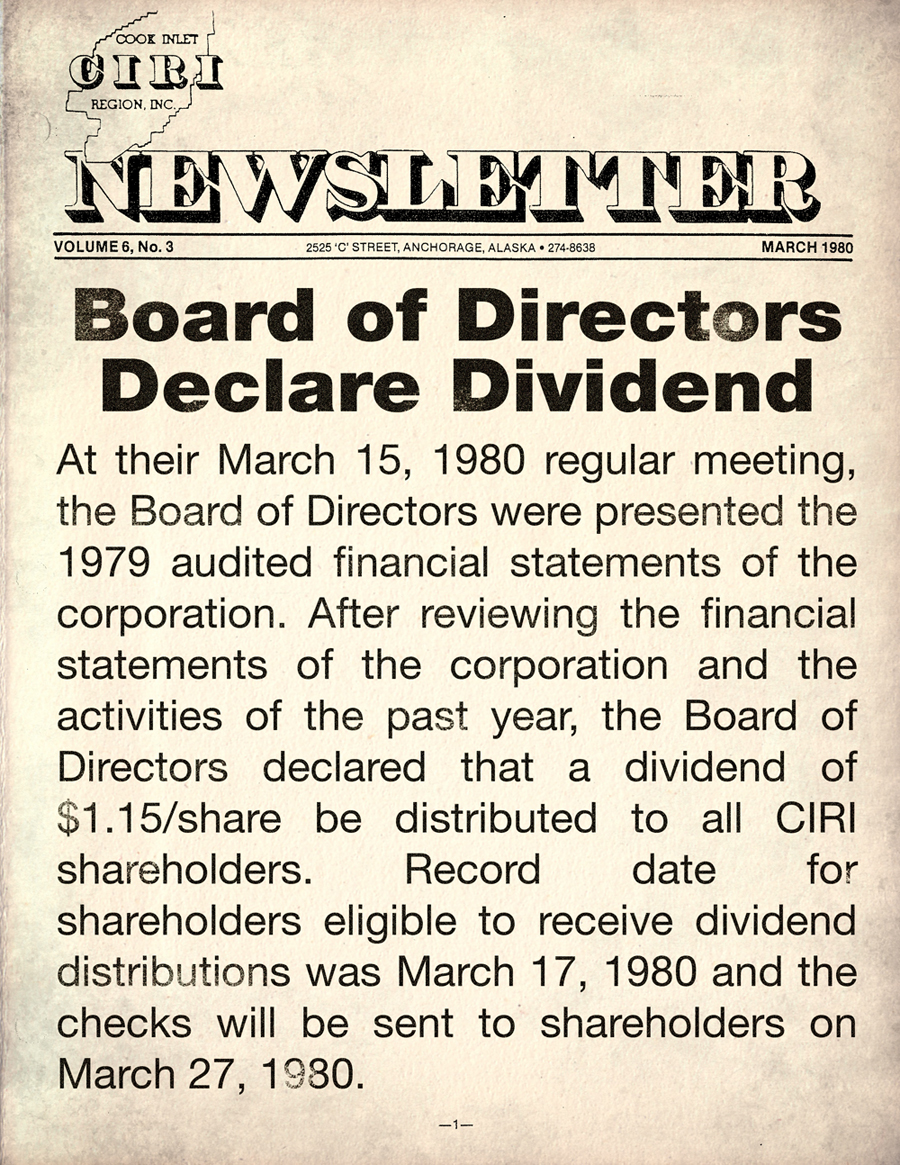 If you are one of the CIRI shareholders who has your dividends directly deposited to your bank account, you probably know that Sept. 30 is the day your account will see the next dividend deposit from CIRI. The third quarter dividend of $8.41 per share will go out that day. For a shareholder with 100 shares, that’s $841 dollars. But the distribution signals something else – an unprecedented achievement for an Alaska Native corporation.
If you are one of the CIRI shareholders who has your dividends directly deposited to your bank account, you probably know that Sept. 30 is the day your account will see the next dividend deposit from CIRI. The third quarter dividend of $8.41 per share will go out that day. For a shareholder with 100 shares, that’s $841 dollars. But the distribution signals something else – an unprecedented achievement for an Alaska Native corporation.With that payment, cumulative dividend distributions to CIRI shareholders, since the company’s inception, will top $1 billion.
“This is a great milestone for CIRI and it demonstrates the company’s commitment to deliver results for our shareholders,” said Sophie Minich, president and CEO of CIRI. “We can thank the wisdom, vision and tenacity of all of the past CIRI leaders and Directors for this – those who fought for our land entitlements, made the smart investments and struck the right balance between funding growth and giving back to shareholders.”
There were approximately 6,280 original shareholders when CIRI was formed and the $1 billion figure translates into approximately $160,000 for each original shareholder owning 100 shares. The dividends have helped shareholders afford everything from basic family needs to buying a home.
“The dollars I received allowed me to offset the cost of a college education for my daughters,” said Denise Morris, an original CIRI shareholder and mother of two. “I’ve also been able to assist my other family members with financial challenges they may be experiencing.”
“And, when you look at the large dividend, members of my family were able to become homeowners. The impact was not only significant, it was life-changing for those who had the opportunity to find affordable housing for the first time in their lives,” Morris said.
CIRI delivered its first dividend to shareholders in March of 1980. That first dividend totaled $1.15 per share, for a total payout of $115 to those with 100 shares. At that time, Roy Huhndorf was president of the company. He remembers the lengthy debate among Board members at the time.
“There were valid concerns about reinvesting as much capital as possible so we could keep the company growing,” Huhndorf said. “At the same time, it became clear to the Board that the only direct monetary benefit for shareholders would be dividends. I think the Board did a good job of balancing dividends with the longevity of the corporation.”
For 33 years, CIRI has paid steady and consistent dividends and has also, at times, distributed special dividends as a result of windfall profits from certain investments. CIRI’s dividend policy has evolved over the years, with the Board setting the current policy in 2009. It calls for annual dividend amounts to be calculated based on 3.5 percent of the total shareholders’ equity, calculated as of Dec. 31 of the prior year. According to the calculation, CIRI will distribute close to $22 million in dividends in 2013.
“There are several benefits with the current policy,” Minich said. “It ensures dividends will be consistent year-to-year so shareholders know what to expect, and it gives the Board and CIRI management a tangible objective – to increase shareholders’ equity – in our strategic planning and when considering investments.”
The $1 billion figure is particularly remarkable when you think back on how CIRI began. The Alaska Native Claims Settlement Act of 1971 resulted in a cash settlement of a mere $34 million for CIRI along with its land entitlements. Unsatisfied with the land offered to CIRI by the federal government, the company’s early leaders fought for a more equitable solution. The resulting Cook Inlet Land Exchange wasn’t settled until 1978, but those early battles provided the foundation for the thriving corporation CIRI would become.
Huhndorf readily admits the early leaders of CIRI didn’t have a lot of experience. “But, we did a lot of research and ultimately made good decisions,” he said.
“Looking back, I’m pretty proud of what we were able to do,” Huhndorf said. “There will always be a debate about the size of dividends, but this accomplishment should make us all feel good. CIRI has done well.”



